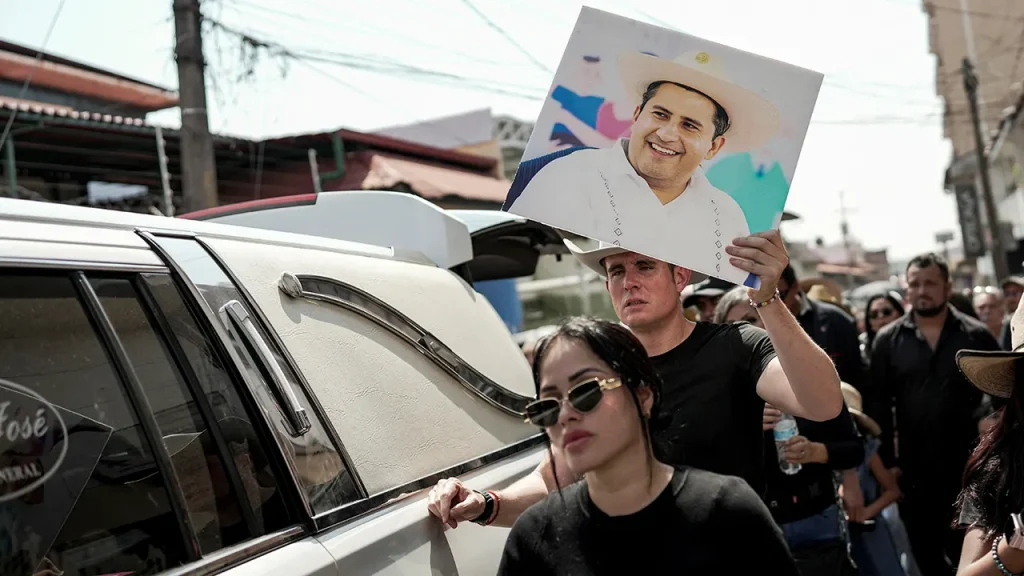A Mayor’s Last Stand: The Tragic Death of Carlos Manzo
In a heart-wrenching turn of events that has shocked Mexico, Carlos Manzo, the mayor of Uruapan in Michoacán State, was fatally shot during a Day of the Dead celebration this weekend. Known for his unwavering stance against drug cartels and his advocacy for stringent anti-trafficking laws, Manzo’s death has cast a somber shadow over a country already grappling with widespread cartel violence. The mayor, who had been vocal about his fears yet determined to stand his ground, was shot seven times at a vigil and later succumbed to his wounds at a nearby hospital. His tragic passing represents not just the loss of a public servant but symbolizes the ongoing struggle between governance and organized crime in Mexico’s most troubled regions.
Just weeks before his assassination, Manzo had publicly criticized President Claudia Sheinbaum’s administration for what he perceived as insufficient determination in combating the cartels that have terrorized Michoacán State. “We need greater determination from the president of Mexico,” he had stated in September, adding with tragic foresight, “I do not want to be just another mayor on the list of those who have been executed and had their lives taken away from them.” His words now resonate with a chilling prescience as he acknowledged his fear while emphasizing his commitment to face the dangers with courage. This stance earned him the nickname “Mexican Bukele,” drawing parallels to El Salvador’s President Nayib Bukele, who has implemented severe measures against gang violence in his own country.
The irony of Manzo’s death is particularly striking when considering the security measures in place to protect him. Authorities reported that his security detail was substantial, comprising personally selected officers and fourteen National Guard members. Yet despite these precautions, assassins still managed to reach him during what should have been a cultural celebration. Mexican Security Minister Omar García Harfuch has promised a thorough investigation, declaring at a press conference, “There will be no impunity.” He extended condolences to Manzo’s family and the residents of Uruapan, acknowledging their “painful and unjust loss at the hands of organized crime.” This official response highlights the challenge faced by Mexican authorities: how to protect public servants who dare to stand against cartels, even with significant security resources.
Manzo’s critique of President Sheinbaum’s approach to cartel violence had been particularly pointed since her inauguration in October 2024. In a May speech that now feels eerily prophetic, he challenged her strategy, saying, “If she thinks she’s going to detain these criminals without a single shot fired and that they’ll just turn themselves in, well, she should get it done. And believe me, if she manages to do that, I will immediately submit my resignation.” This statement reflected his skepticism toward non-confrontational approaches to dealing with violent cartels, suggesting that more aggressive tactics were necessary to combat organizations that have shown little hesitation in using extreme violence to protect their interests and intimidate officials.
The murder of Mayor Manzo is not an isolated incident but rather part of a disturbing pattern of violence against Mexican politicians who oppose cartel activities. Michoacán State, where Uruapan is located, has long been a battleground for rival cartels fighting for control over territory and trafficking routes. Local officials often find themselves caught between these powerful criminal organizations and their duty to protect their communities. Many face the impossible choice of compromise, silence, or standing firm at great personal risk. Manzo chose the latter path, refusing to take “a single step back” despite being acutely aware of the dangers he faced. His assassination serves as a stark reminder of the risks faced by those who challenge cartel power in regions where state authority is contested.
As Mexico mourns the loss of Carlos Manzo, his death raises profound questions about the effectiveness of current anti-cartel strategies and the protection of public officials. The tragedy underscores the complex reality faced by communities and their leaders in cartel-dominated regions: standing against organized crime can come at the ultimate price, yet capitulation threatens the very fabric of democratic governance. Manzo’s final public statements, expressing both fear and determination, capture the human dimension of this struggle. Beyond political calculations and security strategies lies the story of one man who refused to be intimidated into silence, even as he acknowledged the very real threat to his life. His legacy now joins those of other fallen public servants who dared to envision a Mexico free from the grip of cartel violence—a vision that remains elusive as the country continues to search for effective ways to protect both its citizens and those who lead them.


